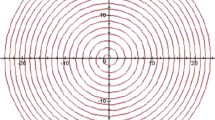Abstract
Rotational fretting tests in a configuration of ball-on-flat have been successfully realized by developing a new fretting device based on an ultra-low-speed reciprocating rotational driver. The rotational fretting tests of LZ50 steel flats against 52100 steel balls were performed under different testing parameters, i.e. the angular displacement amplitudes of 0.25° to 1° and the normal loads of 5 N to 20 N. The frictional kinetics of rotational fretting and the characteristic of wear damage for LZ50 steel were discussed in detail. The results showed that the rotational fretting behavior of the LZ50 was strongly dependent upon the angular displacement amplitude and normal load. Friction force-angular displacement (F t -θ) curves can be used to characterize the rotational fretting running behavior, which exhibited three basic types of the parallelogram, elliptical and linear cycles by varying the angular displacement amplitudes or normal loads. Under the condition of the angular displacement amplitude of 0.25° and the normal load of 10 N, the rotational fretting run in the regime of partial slip, which corresponding elastic deformation coordination at the contact interface. With the increase of the angular displacement amplitude and the decrease of normal load, the fretting running state transferred from the partial slip to the gross slip. The micro-examinations indicated that the plastic deformation, abrasive wear, oxidative wear and delamination were the main damage mechanism for LZ50 steel under the gross slip conditions. A special phenomenon which different from that observed in the tests of the normal reciprocating fretting (tangential fretting), i.e. wear debris generated was accumulated in the centre zone of the wear scar under the condition of gross slip, was observed in this paper.
Access this chapter
Tax calculation will be finalised at checkout
Purchases are for personal use only
Similar content being viewed by others
References
Zhu, M.H., Zhou, Z.R., 2001, “An experimental study on radial fretting behaviour,” Tribology International, 34, pp.321–326.
Bergmann, G., Deuretzbacher G., Heller M., et al, 2001, “Hip contact forces and gait patterns from routine activities,” Journal of Biomechanics, 34, pp.859–871.
Briscoe, B.J., Chateauminois A., Lindley T.C., et al, 2001, “Fretting wear behaviour polymethyl-methacrylate under linear motions and torsional contact condition,” Tribology International, 31, pp.701–711.
Briscoe, B.J., Chateauminois A., Lindley T.C., et al, 2000, “Contact damage of poly (methyl-methacrylate) during complex micro-displacements,” Wear, 240, pp.27–39.
Chateauminois A., Briscoe, B.J., 2002, “Measurements of Friction-induced surface strains in a steel/polymer contact,” Tribology International, 35, pp.245–254.
Author information
Authors and Affiliations
Corresponding author
Editor information
Editors and Affiliations
Rights and permissions
Copyright information
© 2009 Tsinghua University Press, Beijing and Springer-Verlag Berlin Heidelberg
About this paper
Cite this paper
Mo, J.L., Liao, Z.J., Zhu, M.H., Zhou, Z.R. (2009). An Experimental Study on the Rotational Fretting Wear Behavior of LZ50 Steel. In: Luo, J., Meng, Y., Shao, T., Zhao, Q. (eds) Advanced Tribology. Springer, Berlin, Heidelberg. https://doi.org/10.1007/978-3-642-03653-8_93
Download citation
DOI: https://doi.org/10.1007/978-3-642-03653-8_93
Publisher Name: Springer, Berlin, Heidelberg
Print ISBN: 978-3-642-03652-1
Online ISBN: 978-3-642-03653-8
eBook Packages: EngineeringEngineering (R0)




